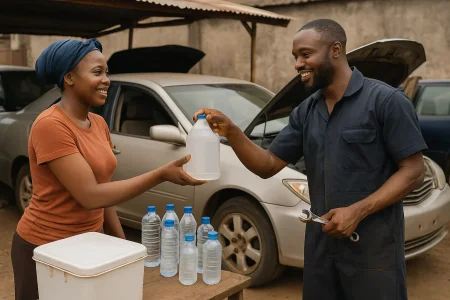
Viral videos showing Nigerians earning "millions" from AC water sales have sparked nationwide interest in this waste-to-wealth venture. With searches for "how to make money from AC water" trending, many are considering this seemingly simple business model. Before you position containers under your AC unit, here's the reality check you need.
What You Need to Know
1. Production Reality: Volume Limitations
Your AC unit won't make you rich quickly. Most residential units produce 4-68 litres daily, depending on humidity and usage. Research from Bangladesh shows average production rates of 1.83 litres per hour for 1-tonne units. In Lagos's dry season, expect closer to 4-19 litres. Even at premium pricing of ₦200 per litre, daily income ranges from ₦800-₦3,600—before expenses. This is supplementary income, not life-changing wealth.2. Quality Control: The Hidden Costs
AC water starts pure but collects contaminants from dust, bacteria, and system components. International studies confirm AC condensate meets irrigation standards but requires treatment for consumption. Safe commercial sale requires filtration systems (₦50,000-₦150,000), UV sterilisation equipment (₦75,000+), and regular testing. Basic containers won't suffice for serious business—you need food-grade storage and handling protocols.3. Customer Education: Building Trust
Most Nigerians are unfamiliar with AC water quality and its applications. You'll spend significant time explaining why someone should buy water from your machine rather than the borehole down the street. Successful vendors focus on specific uses: car battery topping, steam irons, humidifiers, and plant watering where mineral-free water provides clear advantages.4. Operational Costs: Generator Economics
Running the AC for water production requires a constant power supply. Generator fuel costs ₦800-₦1,200 daily for adequate production. Solar power systems cost ₦300,000-₦500,000 upfront but reduce operational expenses. Calculate fuel costs against water sales before assuming profitability—many find the economics unfavourable.5. Legal Considerations: Permits and Liability
Commercial water sales require NAFDAC registration (₦50,000 base fee), business permits, and insurance coverage. According to NAFDAC guidelines, all water products require certification before being put on the market for commercial sale. The process can take over 90 days and involves facility inspections, product samples, and laboratory analysis. Selling untreated water for consumption creates liability risks. Smart operators focus on non-consumptive uses and clearly label products to avoid regulatory complications and health claims.6. Market Saturation: First-Mover Advantage Disappearing
Early adopters found eager customers in water-scarce areas. As the trend spreads, competition increases whilst novelty fades. Sustainable success requires identifying specific customer needs—such as car wash operations, laboratories, or industrial applications — where AC water's mineral-free properties provide genuine value.The Realistic Path Forward
AC water sales work best as supplementary income integrated with existing businesses. Mechanic shops selling to car owners, cleaning services offering mineral-free water for windows, or plant nurseries providing ideal irrigation water. The standalone "AC water vendor" model faces significant scalability challenges.For those determined to proceed, start small with family and neighbours. Test local demand, understand quality requirements, and calculate true costs including power, storage, and time investment. The viral success stories likely involve established businesses adding AC water as an additional revenue stream, not standalone operations.
AC water sales represent resourceful waste utilisation rather than a goldmine opportunity. Success requires treating this as small-scale entrepreneurship with realistic expectations. The real opportunity lies in identifying specific customer problems that AC water solves, not assuming everyone wants to buy water from your machine.
Sources & References
Technical Studies:
- Yale Environment 360: Nigeria AC market analysis and energy consumption data
- Water Technology Magazine: HVAC condensation harvesting benefits and applications
- Scientific Research Publishing: Quality testing of air conditioner condensate (2020)
- ResearchGate: Assessment of quantity and quality studies from Bangladesh and Jordan (2019-2021)
- University of Port Harcourt: Nigerian condensate water quality research
- NAFDAC Product Registration Guidelines and Requirements (2024)
- Zfrica Business Services: NAFDAC registration costs and procedures
- Standards Organisation of Nigeria (SON): Conformity assessment requirements
- Nigerian Trade Portal: Import permit and e-form integration guidelines
Market Data:
- Jumia Nigeria: Air conditioning unit prices and availability
- Yale E360: 500,000+ annual AC unit sales in Nigeria with a 4-5% growth rate




